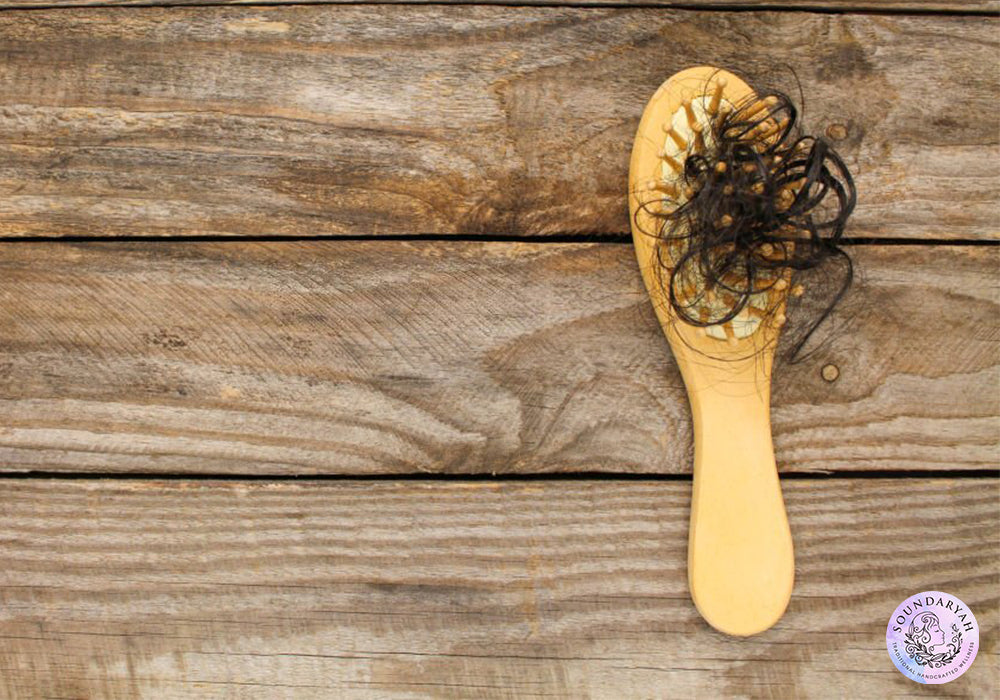You may notice increased hair fall on your hairbrush and the bathroom floor right after giving birth. Before you panic, know that this is not alarming and completely normal during the postpartum period!
All the mums here can probably understand the joys of bringing a new life into this world. Pregnancy is a very special period of time in a woman’s life, it is the beginning of something wonderful and magical. As your due date draws near, you’re probably looking forward to finally meeting your little one. People talk about pregnancy glow, thicker longer hair and a lot of other things but sometimes new mums are not provided with the correct information on the aftermath.
During pregnancy, your hormones change dramatically. These hormones are the biggest reason for your pregnancy hair changes and postpartum hair loss. The most common cause of postnatal hair loss is a decrease in estrogen levels in a woman's body following delivery. You may have noticed thicker hair and less hair fall while pregnant. This is due to an increase in estrogen levels in the body, which prevents hair loss. Soon after delivery, estrogen levels return to normal, causing all of the extra hair strands you accumulated during pregnancy to fall out.
It's critical to keep in mind that postpartum hair loss is only temporary. Many women experience 4 months of postpartum hair loss, and postpartum hair loss can last for several months. Normal hair growth patterns usually resume 6 months after childbirth, but some women may experience postpartum hair loss for up to a year. Our bodies deal with change differently from one another so, it might take more time for some of you to recover from the hair loss but that is completely normal and nothing to worry about! The good news is that by taking care of your nutrition, increasing your intake of certain key nutrients, and nourishing your hair and scalp with some traditional home remedies, you can reduce postpartum hair loss and shedding naturally.
6 Home Remedies for Postpartum Hair Loss

1. Iron-Rich Salad
A significant number of postpartum women can experience low levels of iron or even anemia. Anemia occurs when there is a chronic lack of iron in the body, preventing the body from producing enough haemoglobin, which carries oxygen for cell growth and repair. This is why it is critical to consume iron-rich foods not only during pregnancy, but also during the postpartum period. Eat nutrient-dense foods like dark, green leafy vegetables, legumes and lentils, chia seeds, tofu and chicken to easily increase your intake of this mineral.

Toss in your desired fruits and veggies in a bowl, add a drizzle of olive oil to bring it all together and have this fresh salad to treat your hair loss.
2. Seed Mix with Water
The best part about seeds is that you only need a handful on the go to meet most of the nutrient requirements. Seeds contain oleic acid, protein, iron, biotin, calcium, vitamins A and E, zinc, etc, and that’s why they are the magic potion for your hair growth.

Store a mixture of sesame, kalonji, sunflower, fenugreek, pumpkin and flax seeds in a jar on your kitchen counter. Every morning, grab a handful of this seed mix and gulp it down with some warm water to get great results!
3. Herbal Tea for Hair Growth
Teas have the opposite effect of soda, and they can help to beautify your skin and hair while healing the body. Herbs can be used as medicine to heal the body, and that makes a huge difference when you’re trying to grow hair.

Loaded with numerous health benefits, green tea is extracted from a shrub known as camellia sinensis which is an excellent source of antioxidants. This tea helps in removing the toxins from the skin and helps prevent fine lines and wrinkles. Besides, the tannin in this tea can make your hair shiny and help reduce dry scalp problems. Hibiscus tea is also known for healthy hair growth. It contains collagen, which helps in hair growth.
4. Homemade Ginger-Infused Coconut Oil
The natural warming effects of ginger helps to increase scalp blood circulation. This magical root contains the antioxidant gingerol, which helps to fight against free radical damage and cell repair. Ginger infused oils have even been used as natural hair conditioners, as it is rich in minerals and essential oils to help the hair be more manageable, softer, and shinier.

- Grate 1 tablespoon of ginger finely or blend into a fine paste
- Using a muslin cloth or nut milk bag, strain out the ginger juice
- Combine ginger juice with warm coconut oil and stir well
- Massage the infused oil into your scalp
- Wash thoroughly after one hour
- Repeat once or twice weekly for best results
We, at Soundaryah, have a 100% chemical free non-foaming herbal hair cleanser for naturally healthy and nourished hair. Our hair wash formula has pure herbs like amla, reetha and shikakai in a ratio which doesn’t dry out hair and also includes neem for pH balance and rose petals for softness.
- For medium length hair, mix 3 tsps of Soundaryah’s Royal Herbal Hair Cleanser in a bowl.
- Add sufficient luke warm water to form a rough, wet paste.
- Wet hair thoroughly and then apply the paste all over scalp and hair.
- Massage scalp for a few minutes in circular motions.
- Wash with luke warm water until no residue is left.
- Apply a small amount of a light hair oil like almond or coconut all over hair length to semi damp hair and let dry naturally.
6. Deep Conditioning Hair Repair Mask
We, at Soundaryah, have a wholesome moisturizing and nourishing hair treatment developed on the principles of authentic Ayurvedic hair care. The unique herbs used in this ancient ayurvedic hair mask condition and moisturize hair by penetrating deep into the scalp and every hair strand from the inside out.
- Mix Soundaryah’s Deep Conditioning Hair Repair Mask with sufficient amount of coconut oil or any pure oil to form a thick wet paste. You can also swap oil for yogurt or plain water for your mask base to make for a viscous, fully bloomed mask.
- Apply all over scalp starting from the front area to the back.
- Use soft circular motions to massage the mask into the scalp.
- Now apply the mask on the hair length as well.
- Cover hair with a shower cap or plastic wrap and then wrap head with a towel to prevent dripping and drying out.
- Leave the mask on for ½ an hour to 1 hour and wash off with luke warm water and a mild shampoo.
- Apply a small amount of a light hair oil like almond or coconut all over hair length to semi damp hair and let dry naturally
- Use the mask once a week for deep conditioning your hair from root to tip.

A few other ways to treat postpartum hair loss are to invest in yourself and your hair, and treat yourself once in a while. Make sure to get regular trims to keep dead ends off and healthy. Avoid heat styling as much as possible, such as curling or flat ironing. Shampoos, conditioners, and styling products containing harsh chemicals should be avoided. Look for natural products that are free of harmful fragrances, colours, parabens, and other chemicals. Eating a diet rich in whole foods and nutrient dense meals can help with the massive transition your body is undergoing. Maintaining healthy hair growth with natural herbal remedies such as ginger infused oil can also aid in preventing and reducing postpartum hair loss.
Some people find the postpartum period difficult, so treating yourself to some self-care may be just what you need to look and feel like yourself again!

For more interesting updates do follow us on Facebook and Instagram.


 Verified Purchase
Verified Purchase





![Youthful Glow Herbal Face Wash [100g] - Soundaryah](http://soundaryah.com/cdn/shop/products/1a_b5d64eda-7417-41b9-bad5-b271f4ef68ff_300x.jpg?v=1634899930)
![Royal Herbal Hair Wash [200g] - Soundaryah](http://soundaryah.com/cdn/shop/products/1_300x.jpg?v=1669120964)
![Intensive Body Polishing Ubtan [200g] - Soundaryah](http://soundaryah.com/cdn/shop/products/1a_8728dcb7-c696-447d-b42e-0a56a5326fb6_300x.jpg?v=1634899848)